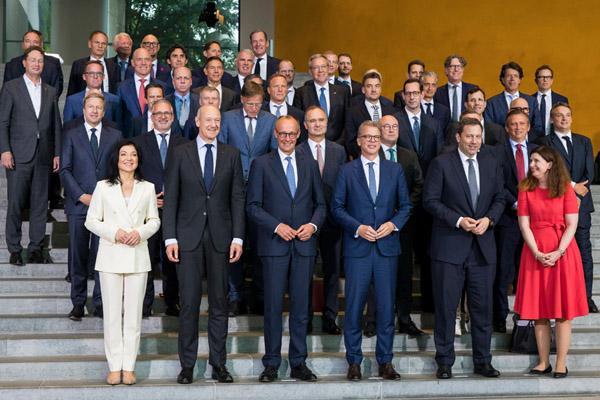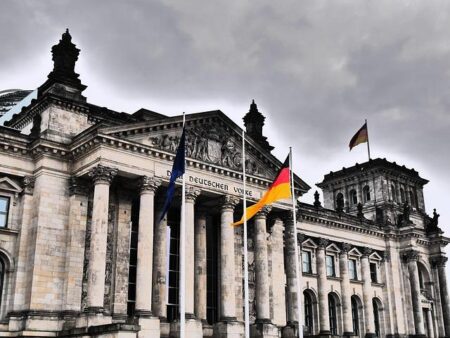Sixty-one leading companies have come together to launch the “Made for Germany” initiative, a bold collaborative effort aimed at reinforcing Germany’s position as a global economic powerhouse. Announced by Deutsche Bank, the initiative seeks to drive innovation, sustainability, and competitiveness across key industries, ensuring the nation’s long-term economic resilience amid rapidly shifting global markets. This coordinated push underscores a renewed commitment from Germany’s corporate sector to shape the future of its economy and secure its standing on the world stage.
Companies Unite to Strengthen Germany’s Global Economic Position
The newly formed consortium of 61 leading companies marks a decisive step towards enhancing Germany’s competitive edge on the global stage. This ambitious initiative focuses on fostering innovation, sustainability, and digital transformation across key industries, aiming to secure long-term economic growth and resilience. By leveraging cutting-edge technologies and forging cross-sector partnerships, the alliance intends to position Germany not only as a manufacturing hub but as a leader in future-oriented economic solutions.
Key pillars of the initiative include:
- Advanced Research & Development: Accelerating breakthroughs in AI, clean energy, and smart manufacturing.
- Skilled Workforce Development: Enhancing vocational training and upskilling programs to meet evolving market demands.
- International Collaboration: Strengthening export networks and global market access through strategic alliances.
- Sustainability Commitment: Embedding eco-friendly practices in production and corporate governance.
| Sector | Lead Companies | Strategic Focus |
|---|---|---|
| Automotive | Volkswagen, BMW | Electric mobility, autonomous driving |
| Technology | Siemens, SAP | Industry 4.0, cloud computing |
| Energy | E.ON, RWE | Renewable integration, smart grids |
| Healthcare | Bayer, BioNTech | Biotech innovation, digital health |
Strategic Focus Areas Driving Innovation and Sustainable Growth
The coalition of 61 leading companies has zeroed in on several keystones to reshape Germany’s industrial landscape and secure its position as a global innovation leader. At the heart of their efforts lies a vigorous commitment to digital transformation, leveraging cutting-edge technologies such as AI, IoT, and advanced analytics to optimize efficiency and agility across sectors. Simultaneously, sustainability is prioritized through ambitious climate targets and circular economy models, ensuring long-term ecological and economic resilience.
Investment in talent development and collaborative ecosystems is equally pivotal, fostering an environment where startups, established firms, and research institutions work hand-in-hand. Key strategic priorities outlined include:
- Green Tech Innovation: Accelerating renewable energy adoption and eco-friendly manufacturing.
- Smart Mobility Solutions: Enhancing infrastructure for electric and autonomous vehicles.
- Industry 4.0 Integration: Seamlessly connecting physical and digital supply chains.
- Global Market Expansion: Strengthening export strategies and international partnerships.
| Focus Area | Key Initiative | Expected Impact |
|---|---|---|
| Digital Transformation | AI-powered production lines | 30% productivity increase |
| Sustainability | 100% renewable energy use | 50% reduction in emissions |
| Talent & Collaboration | Innovation hubs & training | Boost in R&D output |
Key Recommendations for Policy Makers to Support Industrial Collaboration
To galvanize sustained industrial collaboration and innovation, policymakers must prioritize streamlining regulatory frameworks that currently hinder agile partnerships. Simplifying compliance procedures and fostering transparent, cross-sector communication channels will empower companies to work seamlessly across borders and technologies. Additionally, targeted incentives such as tax breaks and innovation grants can catalyze joint ventures, particularly in emerging fields like green technology and digital transformation.
Moreover, investing in infrastructure and talent development remains critical. Establishing centers of excellence and facilitating public-private research hubs will accelerate knowledge-sharing and commercialization. An emphasis on workforce upskilling, especially in cutting-edge digital skills, should accompany these efforts to ensure the future-ready capabilities of Germany’s industrial base.
- Enhance regulatory agility to accelerate partnership formation
- Provide financial incentives for collaborative R&D
- Promote public-private innovation ecosystems
- Invest in digital and green technology skill development
| Focus Area | Policy Action | Expected Outcome |
|---|---|---|
| Regulation | Streamline cross-industry licensing | Faster collaboration launches |
| Funding | Tax credits for joint ventures | Increased co-investment |
| Talent | Upskilling programs in digital tech | Future-ready workforce |
| Infrastructure | Create innovation hubs | Enhanced knowledge exchange |
Insights and Conclusions
As the “Made for Germany” initiative gains momentum with the backing of 61 leading companies, Germany is poised to reinforce its position as a global economic powerhouse. By fostering innovation, strengthening industrial collaboration, and driving sustainable growth, this collective effort signals a determined commitment to securing the nation’s economic future amid an evolving global landscape. Observers will be watching closely as the initiative unfolds, hopeful it will set a new standard for Germany’s role on the world stage.




